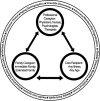Framing the public health of caregiving
- PMID: 17194871
- PMCID: PMC1781412
- DOI: 10.2105/AJPH.2004.059337
Framing the public health of caregiving
Erratum in
- Am J Public Health. 2007 Mar;97(3):393
Abstract
Caregiving has only recently been acknowledged by the nation as an important topic for millions of Americans. A psychological or sociological approach to care-giving services has been most often applied, with little attention to the population-based public health outcomes of caregivers. We conceptualize caregiving as an emerging public health issue involving complex and fluctuating roles. We contend that caregiving must be considered in the context of life span needs that vary according to the ages, developmental levels, mental health needs, and physical health demands of both caregivers and care recipients.
Figures


Comment in
-
Caregiving: a far-reaching public health concern.Am J Public Health. 2007 Nov;97(11):1931; author reply 1931-2. doi: 10.2105/AJPH.2007.119339. Epub 2007 Sep 27. Am J Public Health. 2007. PMID: 17901420 Free PMC article. No abstract available.
-
An ecological framework for caregiving.Am J Public Health. 2007 Nov;97(11):1930-1. doi: 10.2105/AJPH.2007.117390. Epub 2007 Sep 27. Am J Public Health. 2007. PMID: 17901424 Free PMC article. No abstract available.
References
-
- Institute of Medicine. The Future of Public Health. Washington, DC: National Academy Press; 1988.
-
- Talley RC, Crews J, Dorn P, Silvernail J, Hunt G, Zeitzer J. Caregiving in America as an emerging public health issue: surveillance and response by the nation’s public health system. Paper presented at: Second National Center on Birth Defects and Developmental Disabilities Conference, July 2004, Washington, DC.
-
- Shanas E. The family as a social support system in old age. Gerontologist. 1979;19:169–174. - PubMed
-
- Shanas E. Social myth as hypothesis: the case of the family relations of old people. Gerontologist. 1979;19:3–9. - PubMed
-
- Sussman MB. Incentives and the Family Environment for the Elderly: Final Report for the Administration on Aging. Washington, DC: US Government Printing Office; 1977.
Publication types
MeSH terms
LinkOut - more resources
Full Text Sources
Medical

